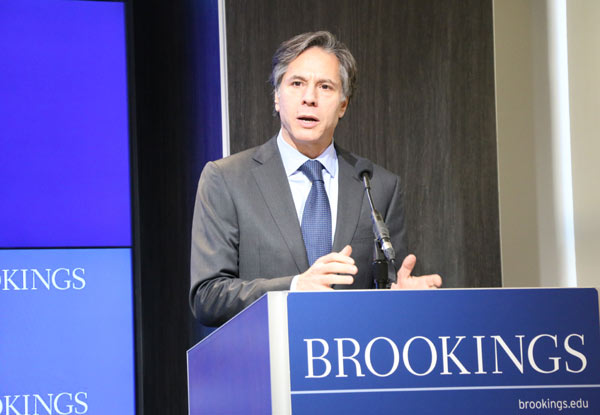US plans to explain THAAD technology with China to ease concerns
By CHEN WEIHUA in Washington (chinadaily.com.cn) Updated: 2016-03-30 10:38
|
 |
|
US Deputy Secretary of State Antony Blinken talks about China and US-Japan-ROK trilateral relationship at the Brookings Institution on Tuesday. Chen Weihua/China Daily |
The meeting between President Xi Jinping and US President Barack Obama will be another important opportunity to advance cooperation and address differences.
Ben Rhodes, US deputy national security advisor for strategic communications, made the comment on Tuesday before a scheduled meeting between Xi and Obama on Thursday on the margins of the fourth Nuclear Security Summit in Washington. It will be Obama's only bilateral meeting during the summit that will be attended by more than 50 heads of state and government.
Dan Kritenbrink, senior director for Asian affairs at the National Security Council, described the meeting as a continuum of senior level engagement between the two countries.
The two last met in Washington in September during Xi's state visit to the US. They then met on Nov 30 in Paris on the margins of the climate conference. The two presidents also had three phone calls since then. And they also are expected to meet on the margins of the G20 summit in China in September.
"I think the high tempo of senior-level engagement with China is a recognition of the fact that this is where problems get solved and decisions get made," Kritenbrink said at a conference call on Tuesday previewing the Nuclear Security Summit to be held on Thursday and Friday.
He said the engagement by the two leaders in Paris helped secure an ambitious climate agreement, and their phone call in February supported the reaching of the agreement on the UN Security Council resolution on the nuclear and missile tests by the Democratic People's Republic of Korea.
Kritenbrink said the high tempo of senior-level engagement has allowed the two nations to identify opportunities for cooperation where their interests align, saying, "I think bilateral cooperation with China right now is exceptionally broad and deep, on issues ranging from climate, to nuclear security to development, public health, Iran and Afghanistan."
Such engagement also has allowed the two countries to address differences in candid and constructive ways, he said. "We don't paper over these differences; we don't hide them; we don't pull punches in addressing them," he said.
US Deputy Secretary of State Antony Blinken echoed the message in a talk at the Brookings Institution on Tuesday on the trilateral relationship among the US, Japan and South Korea.
that while the US worked to assure its allies and partners, it is also determined to build a cooperative relationship with China.
While praising China's role in the denuclearization of the Korean Peninsula, Blinken said that as long as the DPRK does not stop and reverse its nuclear and missile programs, the US will have to take steps to assure its own security and that of its allies and partners.
He was specifically talking about the consultation between the US and South Korea of a possible deployment of a Terminal High Altitude Area Defense (THAAD) anti-missile system in South Korea against the DPRK nuclear and missile threat.
China and Russia have both expressed serious concerns over the possible deployment of the THAAD system.
"We believe China's legitimate security concerns must be taken into account, and a convincing explanation must be provided to China. I don't think it's too much to ask. It's a reasonable position," Foreign Minister Wang Yi said in Washington on Feb 25.
It is believed that the X-band radar associated with the THAAD system has a radius that extends to the interior of China and Russia.
Blinken insisted that the THAAD system is not directed against China and does not affect China strategically, but he said "we know China does not like it".
The US is proposing to go through the technology and specifications with China, according to Blinken. "We would be prepared to explain to them exactly what the technology does and what it doesn't do," he said.
"I hope China will take a step on that proposal, gain greater confidence that it's not directed against China," he said.
Kenneth Lieberthal, senior fellow at the John L. Thornton China Center of the Brookings Institution, hopes that China will take that offer. "I hope if the Chinese side does take that offer, the US side is able to provide the array of information, and detailed information that specialists on the Chinese side will find satisfy their concerns,"Lieberthal said.
"After all, this is diplomats articulating worries. But it takes technical people to understand whether the other side is providing credible assurance," he said.
Lieberthal noted that there is an array of issues for Xi and Obama to talk about on Thursday. He emphasized the importance for the two big powers to work together to tackle global challenge like the nuclear non-proliferation regarding Iran and DPRK.
Describing the tension in the South China Sea as a difficult issue, Lieberthal said all sides need to figure out how to reduce the tension, noting that there is a lot of gray area.
"I think it's the responsibility of governments concerned to figure out how to reduce tension and reduce the possibility of an incident or accident that could inflame passions," he said, voicing his concern that everyone at this point is deeply suspicious of the motives and objectives of the other.
Inside the US government, the voices and tones often differ. On Tuesday, Joseph Dunford, chairman of the US Joint Chiefs of Staff, said that the US is now confronted with simultaneous challenges in Russia, China, Iran, DPRK and violent extremism.




